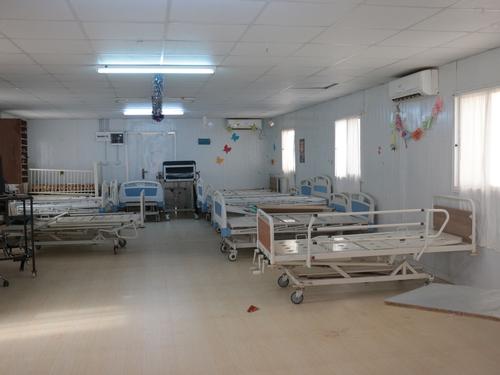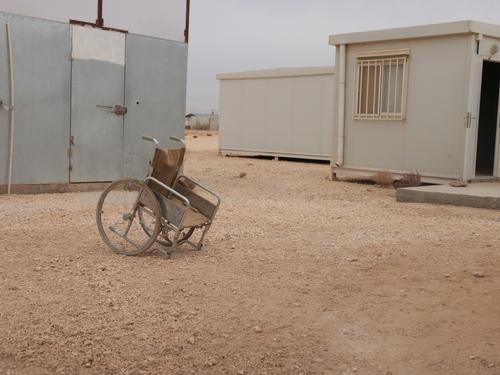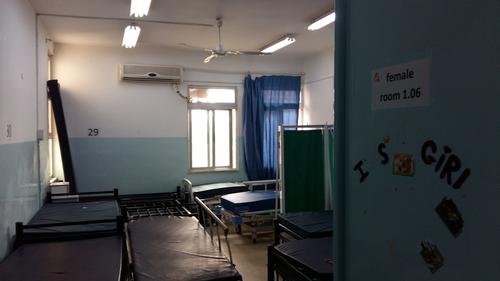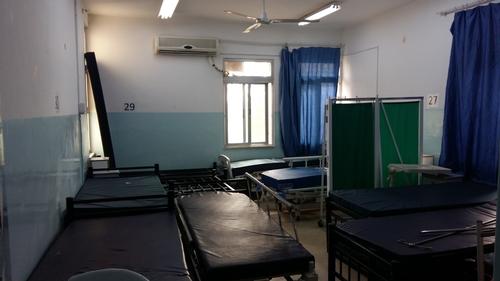Amman, Jordan – A clinic for war-wounded Syrians in northern Jordan is being forced to close just six months after Jordan shut its borders with Syria. At the clinic in Zaatari refugee camp, some 80 kilometres northeast of Amman, MSF provided post-operative care to refugees recovering from surgery carried out in Ramtha and other hospitals.
Jordan's decision to close its border with Syria on 21 June halted the medical evacuation of war-wounded Syrians from southern Syria's Dara'a governorate to MSF's surgical project in Ramtha hospital, where MSF has provided emergency surgical care for more than three years alongside the Jordanian Ministry of Health. Currently its wards are almost empty. As a result, referrals to MSF's Zaatari clinic have plummeted.
MSF's team in Ramtha hospital continues to treat the limited number of war-wounded people allowed into the country. But should the border remain shut, MSF is concerned that its surgery programme in Ramtha will also be forced to close.
Field hospitals in southern Syria are overstretched and are short of staff and equipment. Injured patients may be transferred from one field hospital to the another in pursuit of the required medical expertise or equipment to perform complex surgeries that could otherwise be undertaken in Jordan, risking their chances of survival.
"Fighting and airstrikes in southern Syria have been intensifying since late September, and MSF has received information that the number of Syrians injured in this brutal conflict has increased," says Luis Eguiluz, MSF’s head of mission in Jordan. "However, MSF's ability to save lives has been seriously restricted now that war-wounded are not allowed in, and while we can continue to wait for the borders to open, the seriously wounded do not have the option to wait."
MSF opened its 40-bed post-operative care clinic in Zaatari refugee camp in late March 2014, as an overflow facility for its surgical project in Ramtha to provide convalescent and rehabilitative care to Syrian patients. This included prosthesis, physiotherapy and psychosocial support. A total of 531 war-wounded patients referred from Ramtha hospital and other medical facilities were admitted to the clinic, while staff provided 2,143 outpatient consultations, 1,454 physiotherapy sessions and more than 2,500 mental health consultations.
Today, Zaatari clinic is shut and MSF's wards in Ramtha hospital stand almost empty. Meanwhile the fighting and airstrikes in southern Syria continue unabated, and the need to provide life-saving treatment to severely-wounded Syrians grows. Yet, the Jordanian border stays firmly shut, forcing wounded Syrians to find alternatives or else die.
"Knowing that there are probably patients dying just a few kilometres away on the other side of the border because of lack of access to essential medical care is shameful," says Marjan Besuijen, MSF project coordinator in Zaatari. "The wards inside Zaatari clinic are silent, they are no longer filled with conversations or laughter. But this is not because the violence in Syria has diminished, nor because there are no wounded in need of medical treatment. It is solely due to a physical barrier depriving those desperately in need of life-saving medical care."
Through its medical partners in southern Syria, MSF has recorded at least 70 cases of war-wounded Syrians - 16 of them children - being denied permission to cross the Jordanian border, despite being in need of life-saving surgical treatment.
MSF reiterates its calls on the Government of Jordan to reverse its decision and to open its borders to war-wounded Syrians to enable them to access urgent life-saving medical care unavailable to them in Syria.
MSF has been working in Jordan since August 2006 when it set up a reconstructive surgery project in the capital, Amman. Since 2013, MSF has been running an emergency trauma surgical project in Ramtha hospital, as well as a mother and child hospital and two non-communicable disease projects in Irbid and Ramtha, to support both Syrian refugees and vulnerable Jordanians.






